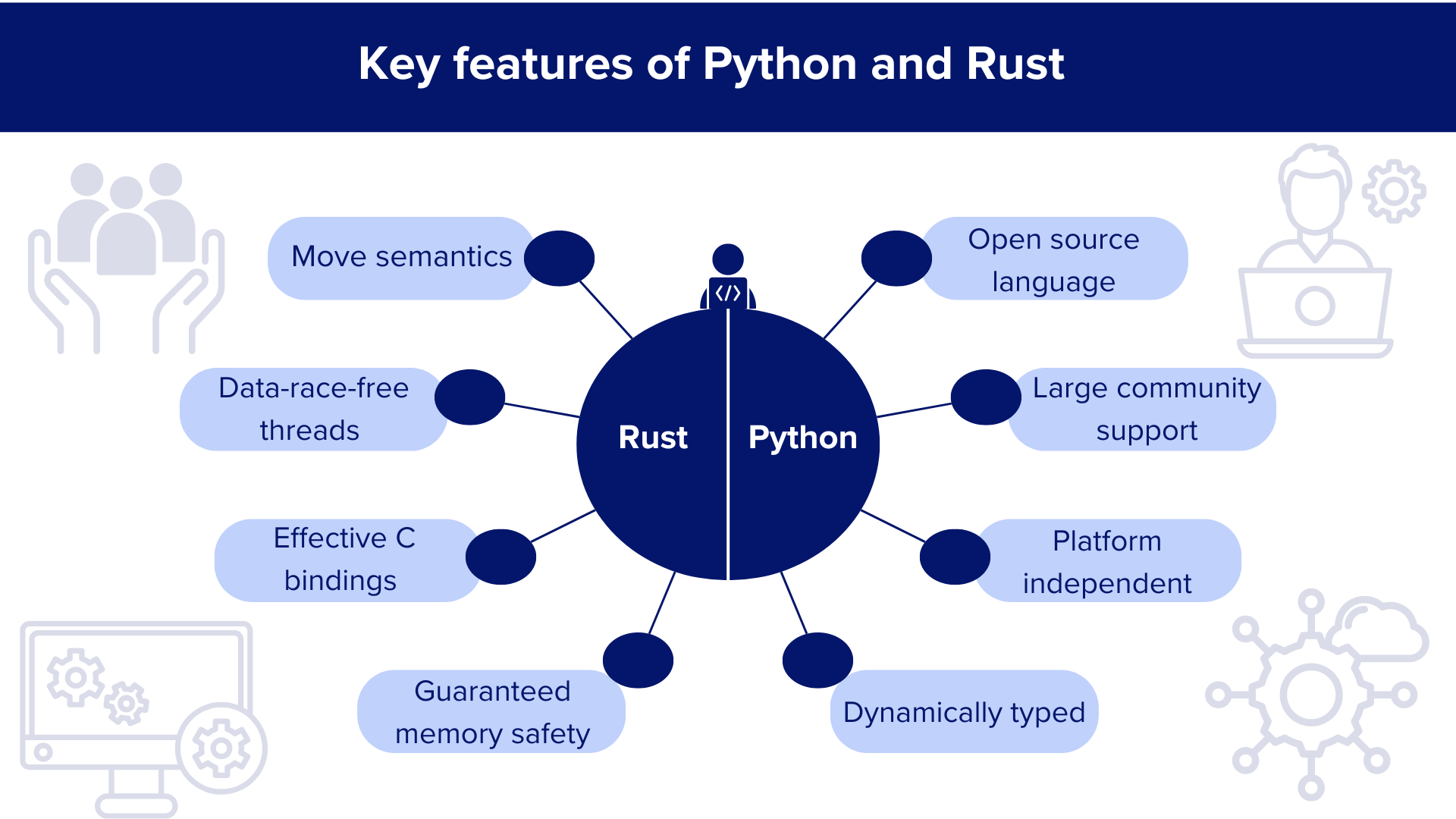Rust vs Python. Which one to choose?


Python and Rust are two programming languages that occupy fundamental positions in various areas of development. Python is a high–level interpreted language that has gained popularity among programmers due to its ease of development and numerous libraries. It is widely used for creating web applications, analysis, machine learning, automation and working with data.
Rust is a programming language introduced by Mozilla, which is compiled and focused on security, speed, and the ability to work in parallel. Rust was designed to use low-level programming in both C and C++, but with a good memory management system, to reduce problems such as memory leaks.
Both groups of languages are effective in one or more ways. Python is becoming known for its simplicity and active support, which is ideal for efficient prototyping and data processing. This is especially convenient for people working in machine learning and AI.
Rust, in turn, does not save on performance, as well as on security. The language allows low-level programming in memory management conditions while minimizing concurrency errors. Today, this makes Rust ideal for system programming and programming where speed and security are critically important.

Python has been gaining interest since the 2000s, and it is still regarded of the most popular programming languages. Ease of development and the speed of application development are other reasons why developers and engineers are so much attached to it. But despite all these merits, Python is still often exposed to prejudice, mainly due to its slow speed in code execution as well a slower performance whenever it is brought into comparison with languages ‘C’ or ‘C++’.
Unlike Python, Rust has been gradually becoming more popular since launching in the year 2010. Owing to its characteristics in performance, security and concurrency, Rust has slowly emerged as the ready solution for developers seeking alternatives to C, C++ in-system programming and developing fast applications.
A well-known fact is that Python has a fairly uncomplicated and basic structure. The lack of explicit parentheses and focus more on code than on visual representation allows developers writing Python programs to devote their time to problem-solving rather than on detailed syntax explanations. This factor makes it appealing to people who have never done programming and those who wish to learn it in a very short period.
On the other hand, Rust is much harder at first, but structured syntax and rules protect against mess. Rust programmers, on the other hand, will have to pay a great deal of attention to memory and thread management, which require a greater level of comprehension. However, despite the higher entry threshold, many developers believe that it is worth it for the sake of performance and security.
One of the essential issues which is devoted much attention when selecting a language is Rust vs Python and the performance issue. Python is one of the interpreted languages, which is why it is often behind compiled languages, in terms of the speed of code execution. How much faster is Rust than Python? Rust is so much more efficient than Python because most of its execution takes place during the compilation and optimization phases. Rust speed vs Python, on the other hand, beats out the two types of languages, especially where handling very large datasets and engaging in complex computations are involved. How much faster is Rust than Python? Rust is many times faster than Python due to compilation and optimization at the build stage.
In terms of the speed of development, Python has the edge in the battle. If the aim is to build quick and useful tools where the end users are not likely to require high performance, a prototype, or an app. Then Python might be more favourable as it makes the developers write and test the code in a shorter time.
Both languages are characterized by a well-developed ecosystem and community support. In particular, Python is forceful in data analytics, machine learning and scientific computing. Popular libraries such as NumPy, TensorFlow, and Pandas have helped place Python in a position of dominance in scientific computing and ML. This makes it an essential language for developers whose job revolves around data science and ML. Nonetheless, when pitted against Python, it would appear as a landslide victory in favour of Python for machine learning. However, when it comes to Rust vs Python for machine learning, Python is still in the lead.
Rust, however, is much more generally deployed in-system programming and high-performance application development. However, its libraries, though fewer, are under active development. For tasks in which the highest performance code or safety in memory management is required – Rust might be the more appropriate option.
Rust is superior to Python in the field of concurrency and multithreading. Python has support for multithreading through GIL, but it also limits its capabilities for working with parallel computing. In tasks where parallel data processing is required, Python is not as efficient. Rust was developed. It provides built-in support for parallelization, which allows developers to write secure and high-performance code with multithreading, which makes Rust the optimal choice for areas where parallelism and security are critical factors.
When choosing between Python and Rust for a project, you need to consider the specifics of the project. Python is ideal for prototyping, data processing, and learning using machine learning. Its simplicity, community support and extensive libraries allow you to solve many tasks with minimal effort. However, if your project requires high performance, security, and concurrency control, Rust will be a more suitable option. Rust allows you to write reliable and fast code, which makes it ideal for system programming and working with high-performance applications. This is one of the benefits of Rust, which makes it the preferred choice for tasks where concurrency and security are crucial.
PNN Soft is an experienced team of professionals who specialize in software development using modern technologies. We will help you decide the appropriate programming language for your project, be it Python or Rust, and ensure high-quality implementation of tasks.
PNN Soft has extensive experience working with various programming languages and modern tools. We will help you take into account all the advantages and disadvantages of Python and Rust to achieve the best results in your project. By choosing PNN Soft, you get a team of professionals who will provide high-quality development and support at all stages of the project.